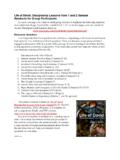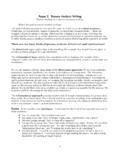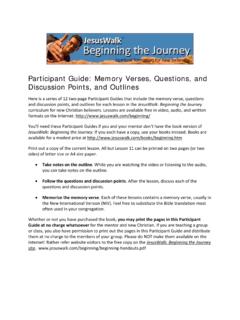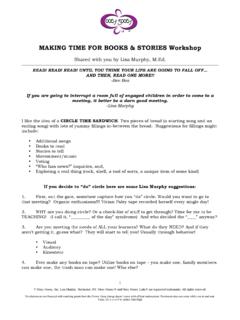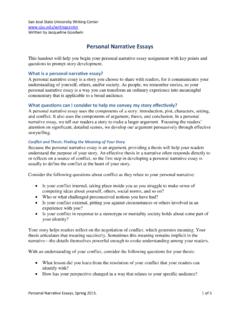Transcription of Sample Lesson Plans - mmind.org
1 Sample Blended Learning Lesson Plans 2007 Edusoft Ltd. 2 Table of Contents Basic 3: Traveling Lesson 1: Listening Component ..4 Lesson 2: Reading Component ..6 Lesson 3: Speaking Component ..8 Lesson 4: Grammar Component .. 10 Intermediate 3: Sport and Fitness .. 12 Lesson 1: Listening Component .. 12 Lesson 2: Reading Component .. 13 Lesson 3: Speaking Component .. 15 Lesson 4: Grammar Component .. 17 Advanced 3: Overcoming 19 Lesson 1: Listening Component .. 19 Lesson 2: Reading Component .. 20 Lesson 3: Speaking Component .. 22 Lesson 4: Grammar Component .. 24 2007 Edusoft Ltd. 3 Introduction The following pages contain three Sample Lesson Plans to help give you ideas for integrating English Discoveries Online in your classroom teaching. The Lesson Plans are based on typical units from the Basic, Intermediate and Advanced courses.
2 These Lesson Plans provide step: by: step instructions on how to prepare for a computer Lesson , what to do while your students are studying on the computer, and ideas for follow: up activities once students have completed their computer assignments. The suggested time for each Lesson is about 90 minutes; however this will vary depending on the size of the class and the level of your students. The pre and post computer activities do not need to take place immediately before and after the computer session they can be conducted over several days, as part of a regular classroom Lesson . 2007 Edusoft Ltd. 4 Basic 3: Traveling Abroad Lesson 1: Listening Component (90 minutes) Pre-Computer Session Learners will: Activate prior knowledge of the topic travel. Familiarize themselves with the language used in voice mail messages. Compare conditional structures with similar structures in their own language.
3 1. Write a list of simple questions about travel on the board. Read the questions with the students and make sure they understand them before beginning. Seat students in two circles or rows facing each other. Ask students to discuss the first question on the list for two minutes. After two minutes, the students move seats so they are sitting facing another person and can discuss the next question on the list. Continue until students have had a chance to discuss all the questions. Sample questions: Which countries have you visited? Which countries would you like to visit? What kind of a holiday do you like? Where are you going on holiday this year? What was your best holiday? 2. Ask students if they have an answering machine at home and ask them what some of the advantages are of using voice mail. Explain or elicit that one of the times it is useful to have an answering machine is when you are away on holiday.
4 3. Familiarize students with the language used in answering machine messages. Discuss with the students the kind of language used in phone messages such as: We are unable to come to the phone right now, If this is an emergency, you can reach us We will return Please leave a message and we will call you back, etc. 4. Review or teach the first conditional and explain that this is a very common structure to use in voice mail messages. Ask students to compare this structure with similar structures in their own language and draw their attention to the fact that although it is used to express a possible future situation, the if clause is not in the future tense. Write some conditional clauses on the board and ask students to complete them: If this is an If you want to speak to me at If we don t answer the phone .. If we aren t in the If you leave a 5.
5 Encourage students to share their answers with the whole class. Note that if you do not feel your students are ready to learn the first conditional you can just teach them the If + can. 2007 Edusoft Ltd. 5 Computer Session Component Title Summary Basic 3: Traveling Abroad Listening Voice Mail: Outgoing Message A voice mail outgoing message in which the Jameson inform callers that they are abroad. Learners will: Understand the general meaning and significant details of a voice mail message. Apply knowledge of conditionals to understand information in a voice mail message. Infer information from a voice mail message. 1. Either prepare handouts, or write on the board the path you want the students to follow in that Lesson , , Basic 3>Traveling Abroad>Listening. 2. Tell students they are going to do the listening component in the English Discoveries Online unit: Traveling Abroad.
6 Explain that they are going to listen to a voice mail message. Ask them to do the Explore section first and to list any words or expressions they don t understand. Refer them to the path on the board if they are unsure of navigation. 3. While students are working, go around the class and make sure they don t have any problems with navigation or comprehension. Encourage them to make use of the different explore options such as See Text and Record Yourself. Draw students attention to the use of the first conditional in the message. 4. Review any words or expressions students had difficulty with and ask them to go on to the Practice section. Students who finish quickly can continue to the Test section or use the Community Site. 5. While students are working, go around the class and make sure they understand the Practice exercises. Encourage them to listen again to the message if they don t remember it.
7 Post-Computer Session Learners will: Produce their own voice mail message. Reflect on the different activities they have done in the Listening component. 1. Tell students to imagine they are going on holiday and to write a voice mail message that says where they are going, where they can be reached, and when they will be back. Tell them they should write at least one sentence of their message in the first conditional. Students can work in pairs and/or complete this task for homework. When they have finished writing, each pair should read its message to the class. If you have access to a cassette recorder, you can actually ask students to record their messages and play them to the rest of the class. 2. Ask students to list the different things they have done in the Lesson , and to decide which activity they think helped them the most and why. Discuss students answers with the whole class.
8 2007 Edusoft Ltd. 6 Lesson 2: Reading Component (90 minutes) Pre-Computer Session Learners will: Identify and categorize vocabulary related to travel. Predict and construct a reading text based on vocabulary from the text. 1. Write the word travel in a box in the middle of the board. Tell students to list as many words as they can associate with the word travel. Give them a time limit of two minutes. Then ask them to suggest possible categories they could use to create a concept map, , places, transport, people, objects to help them organize and remember travel vocabulary. Use their suggestions to draw a concept map on the board such as the following: 2. Tell students they are going to do the Reading component from English Discoveries Online. On the board, write the title of the reading passage Rita s Trip Abroad and some vocabulary taken from the text such as: flight, nervous, abroad, first time, small village, sightseeing, summer, aunt and uncle, worried.
9 Check that the students understand the vocabulary. Divide the class into pairs or and ask them to predict what the text will be about and to write their own version. Computer Session Component Title Summary Basic 3: Traveling Abroad Reading Rita's Trip Abroad A story about Rita s first time away from her small village in Mexico. She is on a flight to Washington, to visit her aunt and uncle. Learners will: Understand the main ideas and supporting details in a story. Understand the sequence of events in a story. 1. Either prepare handouts, or write on the board the path you want the students to follow in that Lesson , Basic 3>Traveling Abroad>Reading. 2. Tell students to do the Explore section of the Reading component and check their predictions by comparing the version of the story that they wrote in the Pre Computer Session with the actual English Discoveries Online text.
10 3. While students are working, go around the class and help them with any problems in comprehension. Encourage them to use the different Explore options such as the Hear Text, Key Words and Main Idea. 4. Ask students to continue with the Practice section of the Reading component. Note: These exercises deal with understanding the main idea and sequencing events, so it is important that students have been introduced to these strategies in class beforehand. Students who finish quickly can continue to the Test section or Community Site. 5. While students are working, go around the class and make sure that students understand the Practice exercises. 6. If you would like to assess your students progress in this component, have them continue to the Test section. Alternatively if students are also using English Discoveries Online in a self: access situation, you can ask them to take the test for homework.

